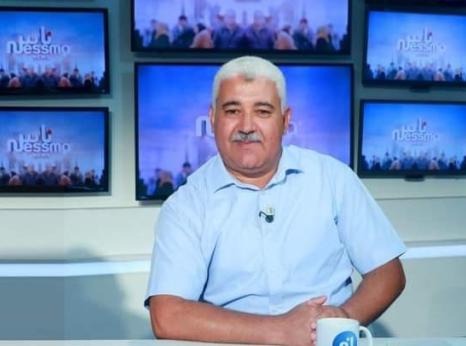Tunisia: Journalist Prosecuted By A Military Court

Salah Attia is a journalist, he is the founder and editor in chief of the online Arabic news outlet Al Ray Al Jadid (the new opinion). The website publishes Tunisian and international news. From time to time, Salah Attia is interviewed by other media as a political analyst on Tunisia.
On the evening of 11 June, police officers in civilians' clothes went to Salah Attia's home in Hay Ettahrir in Tunis where they found his wife and two of his three children. The officers wanted to search the house despite not showing a warrant, but Salah Attia's wife refused according to his daughter Sondes Attia who was not present but shared with Amnesty International what her family told her. The officers asked to speak to Salah Attia on the phone who told them his location in a café in the Ibn Khaldun neighbourhood. Police went to the café and arrested Salah Attia.
Police officers escorted Salah Attia to his home where he changed clothes and then took him away in their car to the military facility of El Aouina for interrogation. They questioned him on the source of his claims about the army as well as his purpose in going public with the story.
After questioning him on the evening of 11 June, police officers transported Salah Attia to Bouchoucha, a detention facility in Tunis, pending his appearance before a military court on Monday 13 June. The investigation against Salah Attia was opened by the Military Court of First Instance, Tunis, one of his lawyers, Samir Dilou, told Amnesty International.
On 13 June, police brought Salah Attia for a hearing before an investigative judge at the Military Court of First Instance, Tunis. One of his lawyers, Malek Ben Amor, told Amnesty International that the investigation is based solely on his remarks on Al Jazeera TV on 10 June. The investigative judge asked Salah Attia to name his source, but he refused, according to the same lawyer, who attended the hearing.
Amnesty International documented an alarming pattern since President Saied’s power grab on 25 July 2021 of recourse to the military justice system to prosecute civilians, including journalists, parliamentarians, a lawyer and a social media user.
Tunisia’s military courts do not fulfil the requirement of independence because the president has final say over the appointment of judges and prosecutors to military courts. In addition, both the general prosecutor who heads the military justice system, as well as all prosecutors in the military courts, who play a pivotal role in initiating proceedings, are serving members of the military and subject to military disciplinary procedures. This places them under the influence of the executive branch, since the president is also commander-in-chief of the armed forces under Tunisia’s constitution.
Under the International Covenant on Civil and Political Rights (ICCPR), to which Tunisia is a state party, everyone has the right to freedom of expression, which includes “freedom to seek, receive and impart information and ideas of all kinds.” The UN Special Rapporteur on Freedom of Opinion and Expression considered that “Custodial sentences for defamation are not justifiable; all laws that provide for criminal penalties for defamation should be abolished and replaced, if necessary, by appropriate civil defamation laws.” The UN Human Rights Committee, the treaty body that is an authoritative interpreter of state duties under the ICCPR, considered that it is not legitimate for states “…to suppress or withhold from the public information of legitimate public interest that does not harm national security or to prosecute journalists, researchers, environmental activists, human rights defenders, or others, for having disseminated such information….”
In addition, in his April 20, 2010 report, the UN special rapporteur on the promotion and protection of the right to freedom of opinion and expression, stated:
[C]riminal defamation laws may not be used to protect abstract or subjective notions or concepts, such as the State, national symbols, national identity, cultures, schools of thought, religions, ideologies or political doctrines